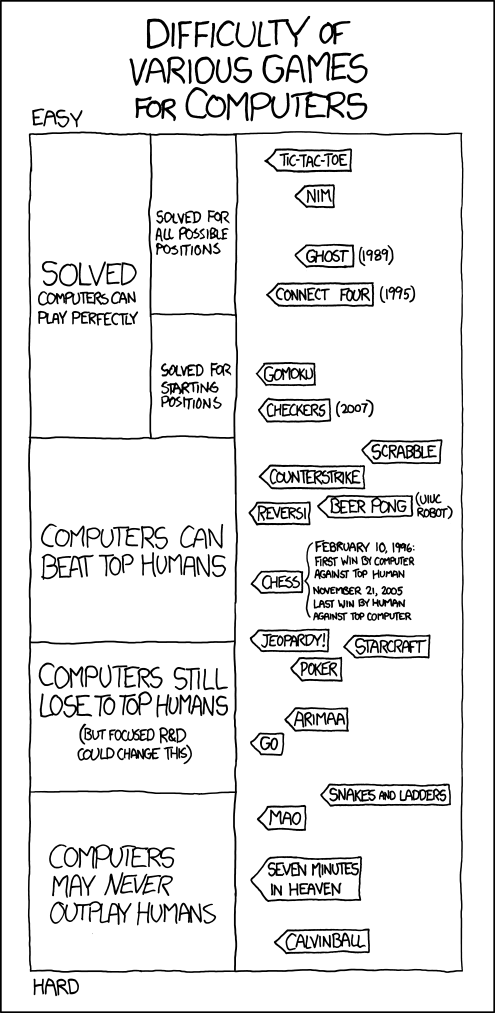That computers are good at beating humans at certain games has been known for a while. Ever since IBM's proud brainchild 'Deep Blue' defeated chess maestro Kasparov in the mid-1990s, there has been a sustained interest in developing meaner and better machines. IBM hogged the limelight once again last year by unveiling trivia-playing beast, 'Watson' and making it compete against Jeopardy! contestants. Watson did very well for itself.
But there are still frontiers that a computer can't cross. Webcomic Xkcd did a nice piece on this:
They should add crossword-solving to the 'computers still lost to top humans' list now. I am a huge huge fan of crosswords. I solve one everyday. Monday ones are easy and it's just a matter of how fast I can do them. As the week progresses, they get progressively difficult. I have never been able to solve a Friday or Saturday one on my own. Top solvers can do Monday ones in about 3 mins (my average time is around 7 min) and Saturday ones in about 15.
That's why I was intrigued when I read that an enterprising soul named Matthew Ginsberg designed a computer program to solve crosswords. This program, Dr. Fill, calculates probabilities of words fitting into a given space and attempts to solve the puzzle. That's fine and dandy for an easier puzzle, say Monday or even Tuesday. For the more difficult ones or ones that have clever pun-filled themes (like Sundays), this program is no match for humans. You see, humans have real experiences and a unique (or near-unique) ability to detect puns, sarcasm etc. Machines can't perform these feats.
Dr. Fill "competed" in the recently concluded American Crossword Puzzle Tournament and, as expected, got owned by more perceptive humans in the harder rounds of the tournament.
Still, it's a pretty neat concept. I hope Ginsberg refines this program and keeps pushing it to achieve at a higher level.
But there are still frontiers that a computer can't cross. Webcomic Xkcd did a nice piece on this:
They should add crossword-solving to the 'computers still lost to top humans' list now. I am a huge huge fan of crosswords. I solve one everyday. Monday ones are easy and it's just a matter of how fast I can do them. As the week progresses, they get progressively difficult. I have never been able to solve a Friday or Saturday one on my own. Top solvers can do Monday ones in about 3 mins (my average time is around 7 min) and Saturday ones in about 15.
That's why I was intrigued when I read that an enterprising soul named Matthew Ginsberg designed a computer program to solve crosswords. This program, Dr. Fill, calculates probabilities of words fitting into a given space and attempts to solve the puzzle. That's fine and dandy for an easier puzzle, say Monday or even Tuesday. For the more difficult ones or ones that have clever pun-filled themes (like Sundays), this program is no match for humans. You see, humans have real experiences and a unique (or near-unique) ability to detect puns, sarcasm etc. Machines can't perform these feats.
Dr. Fill "competed" in the recently concluded American Crossword Puzzle Tournament and, as expected, got owned by more perceptive humans in the harder rounds of the tournament.
Still, it's a pretty neat concept. I hope Ginsberg refines this program and keeps pushing it to achieve at a higher level.


No comments:
Post a Comment